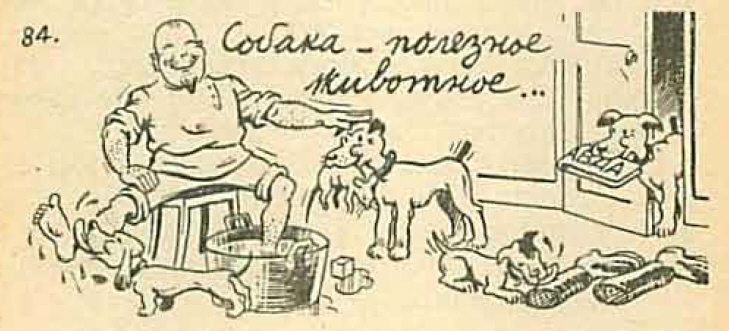
|
Languages
|
| Russian for English speakers 84 |
 |
| Lesson 84 |
|
328 |
Russian |
English Английский |
|
Восемьдесят четвёртый урок (84-й) урок |
Eighty fourth lesson |
|
|
УРОК НОМЕР ВОСЕМЬДЕСЯТ ЧЕТЫРЕ (№84) |
Lesson number eighty four (#84) |
| ПОВТОРЕНИЕ И ЗАМЕТКИ |
|
1 Punctuation, you noticed it, is special in Russian as regards the
comma. It must be put before relative conjunctions, relative pronouns and gerunds. The dash has also a particular part, taking sometimes the place of the verb to be : Собака - полезное животное. The dog is a useful animal. |
|
2 Самодельный: which one has made oneself,
home-made; самолюбие: self-love. Любовь (fem.) : love. — Из-за любви: out of love. — Самовар: samovar (from варить: to boil : self-boiler). - самодовольный: complacent, sell-satisfied. — Самоубийство: suicide (self-killing). — Самолёт: aeroplane (Летать: to fly). — Самоуправление: self-government, administrative autonomy. Самочувствие: "self-feeling", physical and mental state. |
|
З Видеть, я вижу, он видит,
etc... : to see, imperf. — Увидеть, я увижу, etc... (perf.) : to see, catch sight of. — Я его увижу после ужина: I shall see him after supper. — Это видно простым глазом: it's visible to the naked [simple] eye. — Он видный человек: he is a conspicuous man. — По-видимому: apparently. To go to an appointment : идти на свидание. |
|
4 Вертеть (я верчу, он вертит,
они вертят) : to turn, cause to turn (imp.) (S. less. 63, par.
4). Колесо вертится: the wheel turns. — Поворотить (perf.) ; поворачивать (imp.) : to turn (upside down). - Поворачивайтесь: "Turn yourself up", get a move on! - Крутить, кружить (from круг, circle, whence круглый: round, вокруг or кругом, around) : to turn, stir. Земля крутится (or кружится) вокруг солнца: The earth turns round the sun. - У меня кружится голова: My head swims. |
|
5 Мыть : to wash (я мою, он моет,
они моют). Она моет пол: she washes the floor. Я моюсь or я умываюсь: I wash (myself). Вымыть (perf.) Вымойте руки: wash your hands. Умывальник: the wash-basin. Где здесь уборная? : Where are the lavatories? |
|
6 Двигать (imp.), двинуть
(pert.) : to move, stir. Двигаться, двинуться: to start, move off. Не двигайтесь!: Don't stir! Поезд двинулся: The train moved off. — Придвигаться, придвинуться: подходить or подойти: приближаться, приблизиться: to draw near. Подойдите к нам поближе: : draw nearer to us. Вечное движение: perpetual motion. — Неподвижный : motionless. Электрический (бензиновый) двигатель : an electric (petrol) engine. |
|
7 Дать (perf.) : я дам (I
shall give), ты дашь, он даст, мы дадим, вы дадите, они
дадут, : to give. (Compare : есть, to eat (imp.) : я ем, I eat, ты ешь, он есть, мы едим, вы едите, они едят). - Давать (imp.) : я даю, (I give), он даёт, они дают. Подать and подавать: to serve, produce, bring forward. Обед подан: dinner is served. Подавайте лошадей, машину: Bring the horses, the car, forward. Выдать and выдавать : to distribute or denounce. Выдача хлеба: a distribution of bread. - Он нас выдал : he denounced us. Отдать, отдавать: to give back. Отдай волчок: Give me back (my) top. Передать, передавать: to transmit. Передайте мой поклон вашей супруге: Give my regards to your wife. Предать, предавать: to betray. Предатель: a traitor. Предательство: treason. Создать, создавать: to create. Создатель : the Creator. Создание: the creation or a creature... Человек - Божье создание: man is a creature of God (Божий: of God; божественный: divine). And there are still many more verbs composed with дать and давать, but we shall stop here. However let us mention also : Сдаться, сдаваться: to surrender. Сдавайся! : Surrender! Сдаюсь! : I surrender! |
|
8 Participles. — Let us take the imperfective verb
читать. Present gerund : читая: (while) reading. Past gerund : читав, having read. Active present participle : читающий (который читает) : reading (he who reads) ; past : читавший (который читал) : he who was reading. In the perfective (прочитать), no present. So : прочитав, having read, and прочитавший, who had read completely. Likewise, знать, to know, will give us : зная, knowing; знающий, (который знает), знавший (который знал). Passive participles : present : читаемый, which is read. Past : прочитанный, which has been read ; сделанный: which has been made (done); мытый: which has been washed; открытый: which has been opened. Except for the gerund, all these words are declined like adjectives. After a sibilant palatal, the ending я of the gerund becomes a : крича, (while) crying out; лёжа: (while) lying. |